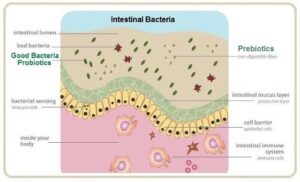The bacteria that reside in the small intestine and colon of the cat play an important role in their overall health. These bacteria constitute a metabolically active system that acts as a significant barrier to infection by pathogenic microorganisms.
The gastrointestinal (GI) tract is the body’s primary barrier against disease. The bacteria that reside within the gut can be classified as either protective or potentially harmful. The balance of these bacteria is critically important to the overall health of all animals.
The Feline Intestinal Tract

The GI tract of the cat is essentially a long unsterile tube that runs from one end of the animal to the other. It is also the largest immune reactive surface in a cat’s body. The nutritional intake and stress they encounter can alter the balance between the good bacteria and those that can cause disease. It can also alter the immune defense mechanisms that occur in the lining of the GI tract.
Inflammation in the gut can increase or decrease gut permeability, thereby altering nutrient absorption and overall health. When your cat’s GI tract is healthy, it allows for the absorption of amino acids, vitamins, and minerals, while at the same time preventing the entry of disease-causing substances.
DNA-based microbiology has provided insight as to how the bacteria that live in the gut prevent disease, affect nutrient absorption, and impact the immune systems of cats.
Maintaining Balance Within the Gut
It is said that our cats have more intestinal bacteria than cells in their body. Symbiosis is when the good bacteria are in balance with the potentially bad ones resulting in optimum gut health.
There are a number of conditions that can cause the good bacteria to decrease in numbers thereby allowing the potentially harmful ones to over-populate. They are:
- Poor Diet
- Antibiotics
- Intestinal Parasites
- Medications
- Steroids
Feline Gastrointestinal Microflora
The complex microflora of the feline GI tract has been studied extensively. Understanding what bacteria are present, in what numbers, and the specific role that each play has allowed us the opportunity to develop Veterinary Health Products capable of supporting gut microflora.
The most significant aspect of feline microflora is the large number of lactobacillus species and the much lower level of bifidobacteria found in felines compared to other animals. Colonic flora is even less well characterized as Bifidobacteria are only intermittently isolated from feline colons.
Probiotic Research
Probiotics for animals (good bacteria) have been investigated as a dietary management tool for many years. The concept evolves around the ingestion of beneficial bacteria leading to improved colonization within the gut.
In addition to feeding probiotics, the additional use of prebiotics has been proven to be beneficial. Prebiotics are a non-digestible food ingredient that is selectively metabolized by the indigenous probiotic bacteria. Using prebiotics can be attractive because they are more stable to heat treatment where probiotics can potentially be unstable.
There is relatively little published research on the use of prebiotics in companion animals. What there is has focused on Lactosucrose and Fructooligosaccharides (FOS).